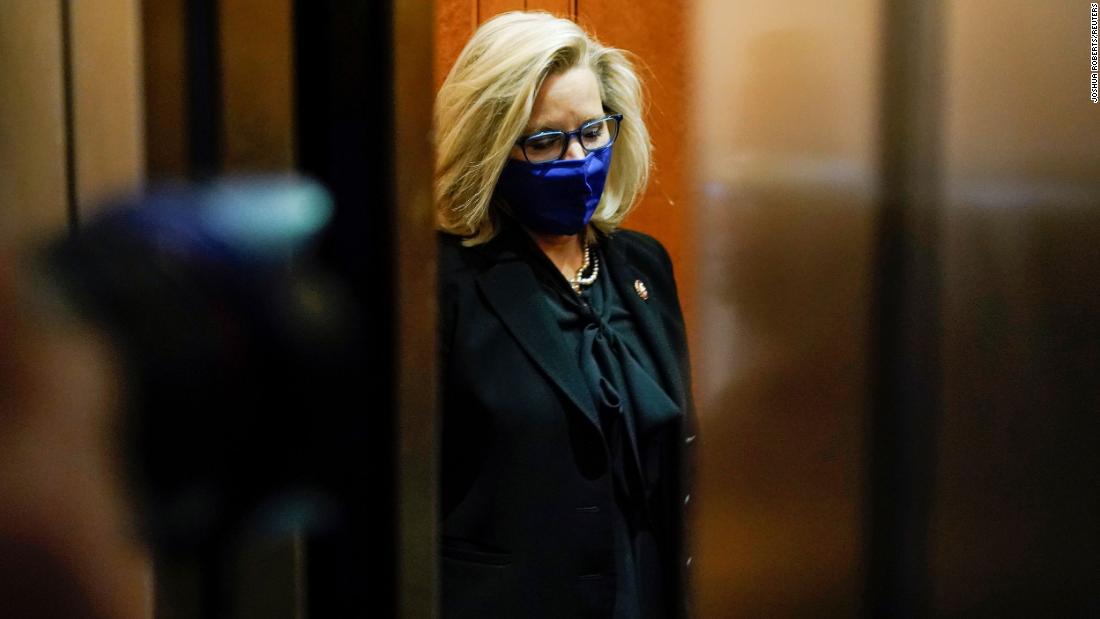The Wyoming Republican entered this week knowing it would likely be her last as a member of the House GOP leadership team
“I think it’s a mistake to think that she’s going to fade,” said one person who knows Cheney well.
“It’s not about right or wrong, it’s about the focus of our conference, and focusing on pushing back on the agenda that’s being pushed by the Biden administration,” said Rep. Steve Scalise of Louisiana, the No. 2 House Republican, on Tuesday.
The question for Cheney is how large and prominent her platform will be once she is no longer a member of the GOP leadership team. The damage done to her brand within the House Republican conference has been significant since her colleagues last voted 145-61 in favor of keeping her in leadership.
A person with knowledge of the Republican delegation told CNN that Wednesday’s vote will likely be “lopsided” against Cheney. House members who stood by her in February, such as Rep. Mike Gallagher of Wisconsin, are turning against her now.
One GOP member who is sympathetic to Cheney says she has “not worked on repairing relationships since February,” saying freshmen members in particular are not happy with her in recent weeks. “She’s not open to much feedback or discussion,” the member said.
“She’s going to remain a compelling story because she’s incredibly articulate and very smart, and because Trump’s not going to let these issues go,” said Eric Edelman, a former ambassador and Pentagon official who also worked as a national security aide for Cheney’s father, former Vice President Dick Cheney.
“Trump is seeking to unravel critical elements of our constitutional structure that make democracy work — confidence in the result of elections and the rule of law. No other American president has ever done this,” Cheney wrote in the Post. “The Republican Party is at a turning point, and Republicans must decide whether we are going to choose truth and fidelity to the Constitution.”
She’s also likely to make a political case that Trump remains a drag on the party. One recent poll conducted for the National Republican Congressional Committee found the former President was underwater in some of the House GOP’s key battleground districts they’ll need to win in 2022, according to a person familiar with the poll results. But the details about Trump’s poor position were excluded from a report on that poll presented to a group of GOP members at a March leadership retreat in Florida, according to that person.
Allies few and far between
As Cheney takes on Trump, she has only a few allies among elected Republican officials. Sen. Mitt Romney of Utah, for instance, has criticized House Republicans for their plans to throw Cheney out of leadership.
“I think we’re better trying to expand the number of people who want to vote for Republicans as opposed to shrink that number. And I think she’s a person of integrity, who follows her conscience and speaks the truth. And I think it will do nothing but drive some people away from our party,” Romney said Monday. “It certainly doesn’t add more people, because the people who are supporters of the President are not going anywhere else.”
“Kevin dismissively responded with ‘ok Adam, operator next question.’ And we got violence,” Kinzinger tweeted. (McCarthy’s office had no comment to CNN about Kinzinger’s tweet.)
And a handful of Republican governors have been resistant to Trump’s influence on the party. Asa Hutchinson, the term-limited governor of Arkansas and a former House member, said the move against Cheney by her GOP colleagues is not “healthy” and has said he won’t support a hypothetical 2024 White House bid by Trump.
Gov. Larry Hogan of Maryland, who did not vote for Trump in 2020 and called for his removal from office after January 6, has also expressed his desire for the party to move on from Trump.
Still, Cheney has few friends in her fight in the halls of Congress, even if Republicans on the Senate side have expressed more unease with how the House is proceeding.
“Cancel culture is cancel culture, no matter how you look at it,” said Sen. Joni Ernst, a Republican from Iowa who’s a member of Senate Minority Leader Mitch McConnell’s leadership team, to reporters on Monday. “I support President Trump and his policies, so I have a slightly different view on that — but I still think we shouldn’t be trying to cancel voices.”
But a number of Senate Republicans downplayed the squabble as simply an inside-the-Beltway dispute that most voters are ignoring. McConnell last week declined to speak on Cheney’s behalf, despite being close to the Wyoming Republican.
And Sen. Lindsey Graham of South Carolina, a strong Trump ally, said on Monday that there is room for members of the Republican Party to be anti-Trump, but there are limits.
“You’re just not gonna be a leader of the party if you’re anti-Trump,” Graham told CNN.
CNN’s Lauren Fox, Annie Grayer, Ali Zaslav, Ryan Nobles, Ted Barrett and Morgan Rimmer contributed to this story.
![]()


